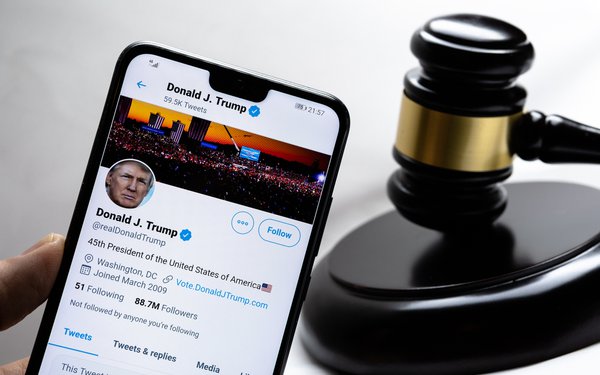
The Supreme Court on Monday granted the Department of
Justice's request to vacate a lower court's ruling that former President Donald Trump violated the First Amendment by blocking critics on Twitter.
The Justice Department argued in a filing in
January that the dispute over Trump's Twitter account was moot, given that he was voted out of office last year. But the government urged the Supreme Court to vacate the lower court decision anyway,
arguing that it could prove “harmful” to other government officials.
The Knight First Amendment Institute at Columbia University, which originally sued Trump on behalf of seven
critics blocked by him, agreed that the dispute was moot, but urged the Supreme Court to preserve the lower court's ruling.
The Supreme Court's move brings an end to a battle dating to the
first year of Trump's presidency, when the Knight Institute alleged in a lawsuit that he violated the First Amendment by blocking people on Twitter due to their viewpoints. The advocacy group
contended that Trump's Twitter account was a public forum -- comparable to city streets, parks and other places where the government can't censor people based on their opinions.
U.S. District
Court Judge Naomi Reice Buchwald in New York agreed with the Knight Institute and ruled that Trump acted unconstitutionally by blocking social media users based on their viewpoints.
The
Justice Department then appealed to the 2nd Circuit, arguing that Trump acts in a “personal” capacity, as opposed to an official one, when he blocks people on Twitter. The First Amendment
prohibits the government -- but not private individuals -- from censoring criticism.
In 2019, the appellate court rejected the White House's position, ruling that evidence of the account's
official nature was “overwhelming.”
The panel judges noted that since becoming president, Trump used the account almost daily to talk about his administration -- including to
announce new policies and changes in the cabinet.
The Justice Department then sought review by the Supreme Court.
After Trump lost the election, the Justice Department argued that the
underlying dispute was solely academic, and urged the Supreme Court to dismiss the case as moot and vacate the 2nd Circuit's opinion.
The Justice Department called that opinion “deeply
problematic,” and argued it “blurs the lines between governmental and personal actions,” and “exposes federal and state employees to constitutional liability when using their
own personal property to speak about their jobs.”
The Knight Institute countered that the 2nd Circuit opinion should be preserved, given the public interest in preventing
“viewpoint discrimination in government-operated social media accounts.”
The Supreme Court's decision was only two sentences, but Justice Clarence Thomas authored a 12-page concurrence that drew the attention of industry observers.
In his opinion, Thomas raised the possibility that large tech
platforms like Facebook and Google could be prohibited from exercising editorial judgment about users' posts.
“The Second Circuit feared that then-President Trump cut off speech by using
the features that Twitter made available to him,” Thomas wrote, referring to the lower court's ruling that Trump violated the First Amendment by blocking critics. “But if the aim is to
ensure that speech is not smothered, then the more glaring concern must perforce be the dominant digital platforms themselves.”
Thomas specifically raised the possibility that large tech
platforms like Facebook and Google could be treated as either “common carriers” or “places of public accommodation.”
If so, those companies could theoretically be
subject to regulations prohibiting them from discriminating against speech based on its content.
“The similarities between some digital platforms and common carriers or places of public
accommodation may give legislators strong arguments for similarly regulating digital platforms,” Thomas wrote.
To date, however, judges throughout the country have rejected any attempt
to subject large digital platforms to those types of common-carrier requirements.
On the contrary, judges have consistently said that Facebook, Google and other web companies have the First
Amendment right to moderate content.